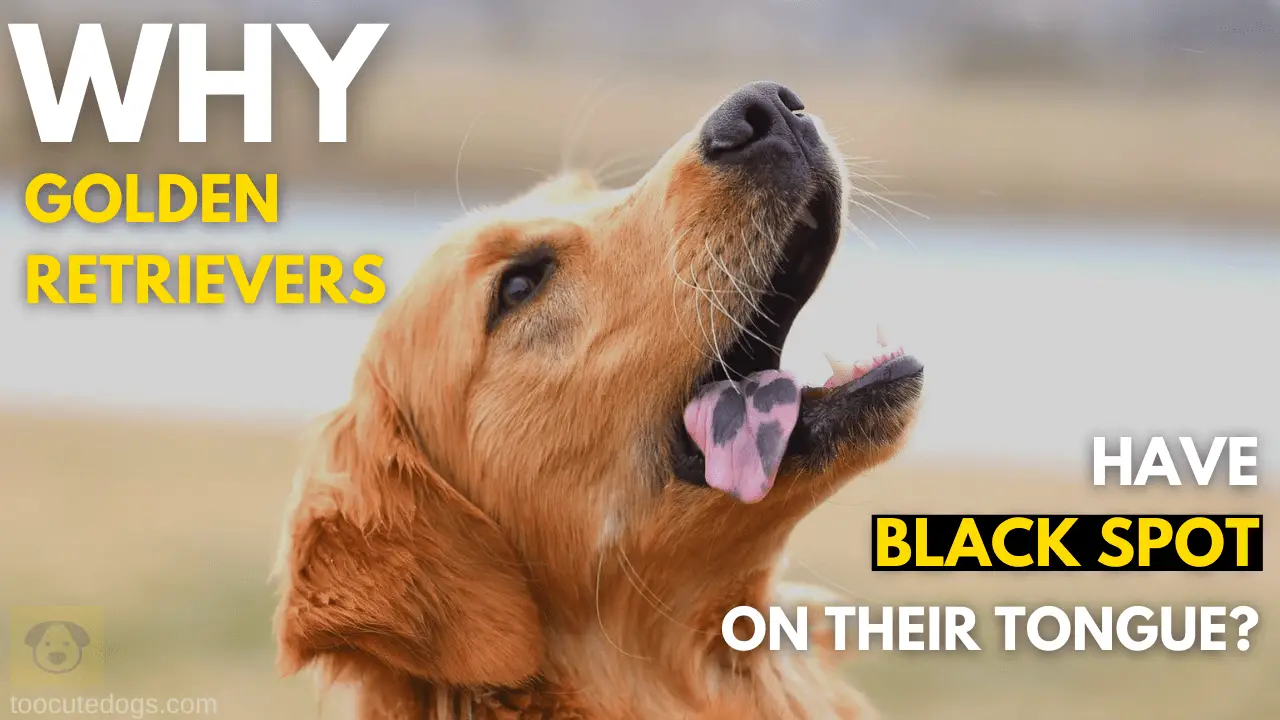As a dog owner, it is normal for you to be concerned about your Golden Retriever’s health. The sudden discovery of black spots on your Golden’s tongue can be alarming, especially when you have had your dogs for ages, and these spots spontaneously manifest. I am here to reassure you that these spots are nothing to fret over.

Some dogs are born with these spots, and a few dogs develop these spots at an early stage in their lifetime, whereas other dogs only experience the development of these spots when they are older.
The black spots on your Golden Retriever’s tongue are entirely usual. However, there are instances when the black spots on your dog’s tongue are a cause for worry.
Let’s straight get into the topic…
Table of Contents
Why Some Golden Retrievers Have a Black Spot On Their Tongue?
The dark discoloring spots on your Golden Retriever’s tongue are derived from hyperpigmentation on their tongue. These excess deposits of melanin result in the darkening of patches on your Golden Retriever’s tongue and are harmless markings. This is so common that it typically occurs in thirty different dog breeds and other animals too.
These dark spots are usually not indicative of a health issue, but some health issues may cause them in some cases.
What Are These Black Spots Actually?
These pigmented spots on your Golden Retriever’s tongue has the same texture as the rest of your dog’s tongue, but the skin appears to be black or bluish. These pigmented spots may change their shape and color slowly over time and are considered normal. Black spots on your Golden Retriever’s tongue are developed either when they are young or born with these spots.
In some cases, these black spots on Golden Retriever’s tongue are suddenly seen; at these times, you should consider going for a veterinary visit.
To understand why some Golden Retrievers have a black spot on their tongue, you need to keep in mind that the black spots on your dog’s tongue are simply from hyperpigmentation on your dog’s tongue. These deposits of excess melanin are not only common in dogs, but it spreads across varied species. These spots even occur on humans in the form of birthmarks, beauty spots, or even freckles.
Have you ever rubbed your Golden Retriever’s stomach and noticed dark spots on their belly? These spots are precisely the same as those on their tongue. These dark spots can appear on different body parts, such as their:
- Paws
- Ear
- Jowls
- Eye Rims
The skin affected by the darkening pigments has the same texture as the rest of the surrounding skin. Like birthmarks on humans, these black spots manifest in different shapes and sizes. These black spots appear randomly across various body parts.
Can These Black Spots On Golden Retriever Tongue Cause Any Harm?
As previously stated, these spots are usually harmless, but there are instances when these dark spots can pose a health problem for your Golden Retriever. You can identify these cases by examining the texture of the dark sports.
If these dark spots have become unusually studded or the texture differs from that of the surrounding skin, it is a cause for concern.
These health issues manifest similarly normal dark spots in your dog’s mouth. To prevent these conditions’ manifestation, you should practice proper oral hygiene care on your Golden Retriever’s mouth.

Even if these oral practices do not prevent the manifestation of these conditions, brushing your dog’s mouth frequently will give you a regular opportunity to examine your dog’s oral health. This will result in early detection of these conditions and prompt treatment, too; you will prevent your dog’s prolonged suffering.
It is unrealistic to expect you to memorize every detail of your dog’s body, but you should try to familiarize yourself with your dog’s features. Knowing what these dark spots initially looked like will help you identify any differences before your dog begins to experience worse and more painful symptoms of possible health issues.
List Of Mouth/Oral Diseases In Dogs That You Should Know?
Educating yourself on possible oral diseases that dogs are prone to, is an excellent way to ease your dog’s suffering because you will be able to promptly identify their symptoms and act appropriately. Here are some oral diseases that are common in dogs:
Canine Stomatitis
Canine Stomatitis is a paradental disease that occurs when the mucous membrane and gums become inflamed. A paradental illness is a disease that does not affect the surrounding tissue. Canine Stomatitis affects the fleshy structures inside your dog’s mouth. It results in the formation of agonizing ulcers, commonly found on the flesh on the inner lip that comes in contact with your dog’s teeth.
Symptoms
- Foul oral odor
- Bloody gums
- Loss of appetite
- Loss of weight
- Irritated mouth
- Extreme sadness
Causes
Canine Stomatitis could be a result of bacteria found within your dog’s mouth. The extreme inflammation that follows the dental plaque could stem from your dog’s autoimmune disorder. Your dog’s body will generate an excessive number of antibodies to combat the bacteria; however, these antibodies initiate Canine Stomatitis.
In some cases, Canine Stomatitis could be caused by triggers such as trauma, foreign objects such splinters being stuck in the soft tissue inside your dog’s mouth.
Treatment
- Antibiotics
- Anti-inflammatories
- Proper oral-hygiene practices
- Removal of teeth (extreme cases)
Inflammation Of The Tongue (Glossitis)
Glossitis is the swelling of your dog’s tongue. Glossitis would not necessarily be considered as a disease but rather a symptom of another disease or a result of another infection and the formation of ulcers.
Symptoms
- Swelling of the tongue
- Struggling to swallow
- Drooling in excess
- Refusal to eat.
Causes
Suggested – Why Do Golden Retrievers Drool?
The following are primary causes of Glossitis:
- Allergic reaction from insect string.
- Autoimmune disease
- Canine Stomatitis
These are some secondary causes:
- Kidney Failure (chronic)
- Respiratory disorder
- Abnormal tissue growth
Treatment
Because Glossitis is usually a symptom of another disease, treatments vary from case to case. Treatment may include the removal of any foreign object by a veterinarian. Glossitis could also be treated with antibiotics.
Lip Disorders
Lip dermatitis is a form of chronic swelling of the skin. This is common in dogs with wilting lips. Lip wounds are caused when your dog munches on sharp items or gets into a fight. These wounds become infected and develop into oral diseases.
Symptoms
- Swollen lip folds.
- Foul odor emitting from lip folds.
- Inflamed lip folds.
- Refusal to eat.
- Discoloring of hair in the infected area.
Causes
The dogs’ wilting lips gather up the moisture that causes inflammation to occur. Inadequate oral hygiene could aggravate the condition. Different irritants that your dog may chew on could cause inflammation of your dog’s lips. These inflammations could be associated with the growth of tumors. The infection can spread to other body parts through licking and scratching.
Treatment
- Cutting of hair
- Cleaning of lip folds
- Antibiotics (bacterial infection)
- Prescribed rash cream
Fungal Stomatitis
Fungal Stomatitis is a rare cause of inflammation in a dog’s mouth. This disease is associated with other underlying disorders.
Symptoms
- Foul breath
- Excessive drooling
- Reluctancy to eat
- Open wounds in the mouth
Causes
Fungal Stomatitis is a result of the overdevelopment of the Candida fungus.
Treatment
- Antibiotics
- Dietary alterations
Trenchmouth (Necrotizing Ulcerative Gingivitis)
Trenchmouth is a rare disease that causes gum inflammation, the growth of ulcers, and necrosis in the mouth.
Symptoms
- Inflamed gums
- Bloody gums
- Receding gums
Causes
The cause of Trechmouth has yet to be discovered. Although, it has been hinted that bacteria and micro-organisms in the dog’s mouth could be responsible for causing Trenchmouth. This can only be the case when another factor affects the dog’s infection resistance level. Malnourishment could be another potential cause of Trenchmouth.
Treatment
- Removal of tooth
- Cleansing of wounds (professionally)
- Antibiotics
- Gum infection treatments
Suggested – How To Care Of A Golden Retriever?
List Of Dog Breeds Who Have Black Spots On Their Tongue
These are the dog breeds who also come across these black spots on their tongue, it’s not only your dog (Golden Retriever.)
- Airdale
- Australian Cattle Dog
- Australian Shepherd
- Belgian Sheepdog
- Bull Mastiff, Cairn Terrier
- Chow Chow
- Collie
- Pomeranian
- Pug
- Rottweiler
- Tibetan Mastiff
- Cocker Spaniel
- Dalmatian
- German Shepherd
- Golden Retriever
- Labrador Retriever
- Mastiff
- Shiba Inu
- Siberian Husky
- Soft-Coated Wheaten
Not only do dogs have those black spots on their tongue, but also a few animals have these black spots; the polar bear and the giraffe are one of them. I’ve not covered the whole list of dog breeds with a black mark on their tongue; these were a few from the list mentioned in the black tongue debate on Columbus Dog Connection.
FAQ
Do All Golden Retrievers Have A Black Spot On Their Tongue?
No, all Golden Retrievers do not have a black spot on their tongue. These black spots are equivalent to the birthmarks that can found on human bodies. These black spots will manifest randomly on different Golden Retrievers. Just like some people have birthmarks, and others do not, the same applies to Golden Retrievers.
Can These Black Spots Be Removed Or Changed?
No, these black spots cannot be removed. There are no safe methods of removing these black spots, and I do not suggest that you look into doing such a thing to your dog. These black spots are a part of your dog and add to your dog’s uniqueness.
What If My Golden Retriever’s Whole Tongue Starts Turning Bluish?
This is a cause for concern. It could indicate that your Golden is experiencing cyanosis. This occurs when your dog’s red blood cells are not receiving enough oxygen, and in this case, you should urgently take your dog to a veterinarian.
Can A Purebred Dog Have A Black Spot On Their Tongue?
Yes, A pure breed can have a black spot on their tongue. The chow-chow breed legend is nothing but a legend. When a dog has a black spot on its tongue, it does not mean that your dog is a chow-chow crossbreed.
Conclusion
If you were in a search for a perfect answer to “Why Some Golden Retrievers Have A Black Spot On Their Tongue,” then I hope that I’ve helped you out. I’ve laid out the list of possible mouth/oral problems and have explained the main reason behind the black spots on Golden Retriever’s tongue in the simplest way possible.
When asking yourself why some Golden Retrievers have a black spot on their tongue, remember that these black spots are completely normal and should be appreciated because, in some cultures, these black spots are a sign of good fortune.
The black spots on your Golden Retriever are OK, but if it stinks, then it’s problematic; otherwise, there’s nothing much to worry about. I would recommend going for a veterinary visit if the black spot starts stinking.
You should spend quality time with your Golden and familiarize yourself with their features so that you can identify abnormalities and contact your veterinarian as soon as possible.
Recommended Read
- Best Dog Food For Golden Retrievers With Skin Allergies?
- How Much To Feed A Golden Retriever?
- Do Golden Retrievers Have Dewclaws?

